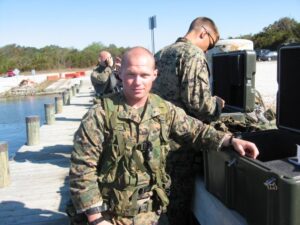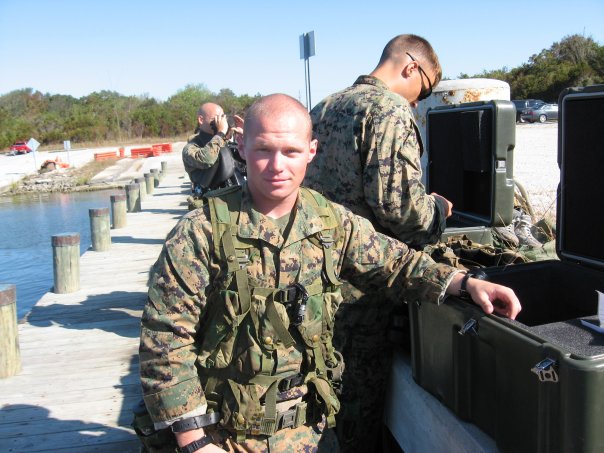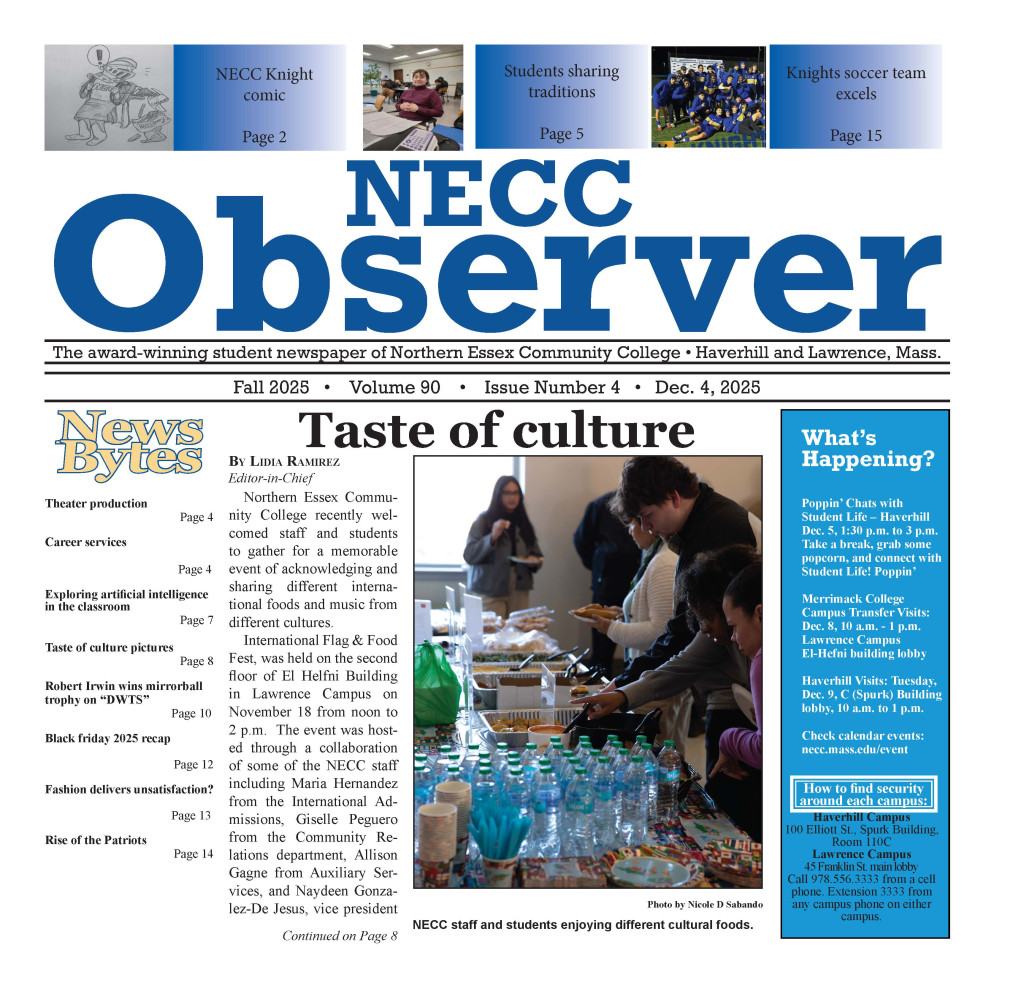
At NECC there are many people from all walks of life and with different experiences to bring to the table.
Rob Wormald, a philosophy major, served in the United States military. Wormald was a Reconassiance Marine with the rank of Sergeant (E-5) in the Marine Corps, with 2D Reconassiance Battalion, Charlie Company. He came back to NECC after initially enrolling at age 18, and then going off to the Marine Corps.
“I got out of high school in 2005, I came here for a semester before I got into the military and it’s just funny coming back because I see how I used to be, you know when I was 18,” Wormald said.
A lot has changed for Wormald since that one semester, and after gaining a ton of life experiences in the military.
“It’s an adjustment for sure, just the way that you interact with people and like the way I could talk in the military is not the way that I could talk now — and it should be like that, too, because it’s a different animal.
In the military you’re judged more on what you’re capable of doing and what you have done, and your presentation is really kind of on the back burner if you’re swearing all the time and stuff. “It’s like a huge locker room,” Wormald said.
On a college campus, everyone is on an even playing field — which is a huge adjustment for a sergeant, coming from a rank where respect is granted automatically.
“It doesn’t matter what you did in the military. No one cares, and they shouldn’t. Not that they don’t care that you did it, but you chose to do it.”
Wormald said, “No one forces you, you weren’t drafted and it’s just hard coming from five years of that and I was a sergeant, I was an E-5 so you have a little bit of power as far as when you’re there. In the respect you should be back in the real world, you shouldn’t just get that (respect) just because you’re in the military.”
Because of his habits of higher rank, Wormald has had to fight a tendency to demand more respect of his peers and professors than is given to the general student body.
He stressed that he learned many valuable life skills from his time in the military, and the good qualities he learned are a meaningful advantage in his school life. But it’s important to be able to leave the other stuff behind.
“In all honesty, anything I did in the military doesn’t really carry over as far as I’m concerned, unless you talk about work ethic, maturity, stuff like that — which is good, but I shouldn’t get an A because I was in the military.”
One of the biggest challenges Wormald has faced in coming back to NECC is some professors have not quite been understanding of the adjustment involved in coming back to civilian life.
“I’m not gonna let someone, just because they’re a professor, think that they’re above me and show me the same respect that I’m showing you. Good professors understand that it’s how you carry yourself. They may not know you’re a veteran but the way you address them when talking to them personally ,emails and stuff. I come to school like it’s a job.”
School in many respects is preparing its students for careers, and treating school like a job is key for success. Wormald said that if he hadn’t spent time in the military before coming to NECC, “it would definitely be different. [In the military,] a lot of it is rank structure and stuff like that, and luckily the unit I was with, rank obviously mattered, but it was more about what you brought to the table to make your platoon better and your battalion better.”
This has helped Wormald cope with professors who weren’t respectful in the way he felt they ought to have been.
“Don’t be afraid to ask them questions, don’t take what they say for face value if you have a question. Don’t be afraid to challenge them,” Wormald said.
“It’s funny, it was my first day at NECC coming back. The professor sets this table of what you think school is gonna be like. My first class, the teacher that I had for that class she had said something about wherever she was from didn’t have an army so they had no blood on their hands. And that was my first like, ‘welcome to college,’ and I’m sitting there thinking I got buddies that died.”
Situations like this are just part of the shift from military life to that of a college student.
Both students and professors have a variety ideas, morals, and ways of thinking — and exploring those different experiences is part of what makes college both challenging and frustrating.
Wormald said that he can usually tell within the first day of class whether a professor’s style and ideals meshes with his own.
“How are you going to set the tone for any veteran, and obviously you’re right there I’m already gonna have my defenses up and now it’s like, ‘so that’s how it’s going to be,’ and I thought every professor was going to be like that until I really got to know them.”
Despite the rough start, Wormald is very happy at NECC.
“I think NECC is a great school. First of all, the improvements they’ve made, when I was first here the tech center wasn’t here and all that stuff it’s a lot of what you make of it.
I think NECC does a great job to where other than one or two professors I’ve had, they’ve all been very good as far as even if they disagree with my views they aren’t disrespectful.”
A roadblock for many students is fear of sounding unintelligent in a classroom setting or not having those skills to articulate themselves in a manner where they will be understood.
“Just because someone can’t talk the greatest in a public setting doesn’t mean they’re not intelligent. They just don’t have those skills yet to get their point across.”
“I’ve had some classes with people that knew me outside of NECC and when they’re in class they’re like ‘wow, you’re actually pretty intelligent!’”
The GI bill is a huge help to all veterans. When a person completes their military service, they fill out the Veteran Action Form or VON app, and they are provided 36 months of school.
The GI bill will cover many different types of schools and programs, including technical schools, community colleges and four year colleges.
The veteran then submits the Veteran Action Form. The amount a veteran gets for other things like housing depends on where they are located, but school is almost always entirely covered. Parts of the GI Bill include tuition, book stipends, and BAH or basic housing allowance depending on location. If schooling is not entirely covered by the GI bill, a veteran can contact the Yellow Ribbon Project and organizations like it for further aid in school or other services.
“I use the GI bill, so I don’t have to pay anything but do two years here, save your money and go wherever you want. I think just the environment, the people I’ve worked with as far as in classes and stuff like that, is pretty good.”
Wormald highly recommends that any veteran returning from serving in the military should come to school, even if they don’t know what they want to do. It can help veterans reacclimate to civilian life.
“The biggest adjustment is realizing the military thing is over. Take the good stuff with you, the work ethic, the memories, the maturity; but the other stuff you gotta just leave behind. That’s the hardest part because you’re coming from somewhere you mattered if you had an opinion, people are gonna listen.
Now it’s, like, not that people won’t listen but you’re just a student just like everybody else.” One struggle Wormald faces is watching other students in some of his classes not taking it as seriously as himself especially when it becomes distracting to his own learning experiences.
“You gotta have respect for your instructors, and they will show it to you back. That’s the biggest thing, the way you come off. If I see someone texting or something like that near me and that’s distracting me then I’m gonna tell you, because now you’re taking away from my learning. If you don’t wanna learn go sleep in your car; I don’t really care.”
A turning point in Wormald’s academic career came in one of his classes where he was to give a presentation and the girl sitting near him under her breath to a friend mentioned how she was nervous to present after him.
This is a big deal for someone who was previously not comfortable articulating his thoughts in a classroom setting or presentation.
“It was actually pretty cool because I was in one of my classes, and I was supposed to do a presentation, and I remember one of the girls sitting behind me was like ‘oh I don’t want to go after him’ (referencing Wormald) because you know, like I said I’m able to really articulate myself. I took that as a compliment because I do realize how far I’ve come.”


